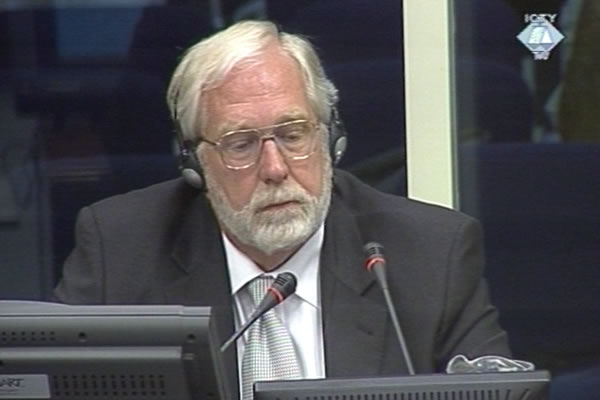Home
KARADZIC’S ‘LOVE FOR SARAJEVO’
Yesterday Karadzic said that he too felt as a Bosniak but this identity was not available for him because ‘the Muslims usurped’ it. Today Karadzic noted that he considered himself to be a Herzegovinian although he was born in Montenegro. He went on to describe how his ‘love for Sarajevo’ was born
 Robert Donia, witness at the Radovan Karadzic trial
Robert Donia, witness at the Radovan Karadzic trial Continuing his cross-examination of American historian Robert Donia, Radovan Karadzic went on presenting his view of the history of the countries and nations in the former Yugoslavia. Karadzic covered a wide range of topics, from the Berlin Congress in 1878 to the establishment of the ethnic-based political parties in 1990 in BH.
Karadzic yesterday said that he felt as a Bosniak, but he complained that Muslims ‘usurped’ that name. Today Karadzic said that he also considered himself to be a Herzegovinian, at least by origin. His native village of Petnica on the Mount Durmitor was once a part of the Old Herzegovina, which was a ‘Serb land’. After the Berlin Congress, the territory was annexed to Montenegro. Although Montenegrins as a rule went to Belgrade to get their education, Karadzic said he chose Sarajevo ‘because of his love’ for Bosnia and Herzegovina and Sarajevo where he got his ‘homeland identity’. In his effort to show that he was on good terms with the Muslims in Sarajevo until the conflict, Karadzic mentioned his ‘last haircut at Meho’s’.
As today’s hearing progressed Karadzic also mentioned some issues rather more relevant for his case. He spoke about the establishment of ethnic-based political parties in BH in 1990, the Party of Democratic Action, Croatian Democratic Community and the Serbian Democratic Party. In its platform, the SDS advocated peace, democracy and equality, Karadzic noted. The SDS was a ‘fair and acceptable’ partner for other ethnic parties in power in BH at the time.
Karadzic also spoke about his excellent relations with SDA president Alija Izetbegovic; this despite the fact that yesterday he described Izetbegovic as a former political convict and follower of the ‘Young Muslims’ and other ‘Hitler’s friends’. Izetbegovic’s initiative to recognize the sovereignty of BH in January 1991 was in Karadzic’s view a big surprise for everyone. Before that Izetbegovic had been saying that he was in favor of BH remaining in Yugoslavia, Karadzic said.
As the hearing neared its end Karadzic asked Donia if a million and a half Serbs in Bosnia and Herzegovina had a right to fight for their political and economic prosperity. Donia replied that all citizens had the right to that but they ‘don’t have the right to eliminate member of other ethnicities from territories they claim as their own, and they don’t have the right to appropriate those territories’.
Karadzic will continue his cross-examination of Robert Donia next week.
